Maggie Gee - The Ice People
Здесь есть возможность читать онлайн «Maggie Gee - The Ice People» весь текст электронной книги совершенно бесплатно (целиком полную версию без сокращений). В некоторых случаях можно слушать аудио, скачать через торрент в формате fb2 и присутствует краткое содержание. Год выпуска: 2008, Издательство: Telegram Books, Жанр: Фантастика и фэнтези, на английском языке. Описание произведения, (предисловие) а так же отзывы посетителей доступны на портале библиотеки ЛибКат.
- Название:The Ice People
- Автор:
- Издательство:Telegram Books
- Жанр:
- Год:2008
- ISBN:нет данных
- Рейтинг книги:4 / 5. Голосов: 1
-
Избранное:Добавить в избранное
- Отзывы:
-
Ваша оценка:
- 80
- 1
- 2
- 3
- 4
- 5
The Ice People: краткое содержание, описание и аннотация
Предлагаем к чтению аннотацию, описание, краткое содержание или предисловие (зависит от того, что написал сам автор книги «The Ice People»). Если вы не нашли необходимую информацию о книге — напишите в комментариях, мы постараемся отыскать её.
imagines an ice age enveloping the Northern Hemisphere. It is Africa’s relative warmth that offers a last hope to northerly survivors. As relationships between men and women break down, the novel charts one man’s struggle to save his alienated son and bring him to the south and to salvation.
Maggie Gee
The White Family
The Flood
The Ice People — читать онлайн бесплатно полную книгу (весь текст) целиком
Ниже представлен текст книги, разбитый по страницам. Система сохранения места последней прочитанной страницы, позволяет с удобством читать онлайн бесплатно книгу «The Ice People», без необходимости каждый раз заново искать на чём Вы остановились. Поставьте закладку, и сможете в любой момент перейти на страницу, на которой закончили чтение.
Интервал:
Закладка:
My mum, my mum … He was still a child.
Briony went and put her arm around him. She didn’t have to disapprove so clearly. I left them to get on with it. I thought, we’ll have to lighten our load. I got into the car and looked around.
Dora sat there, looking blank and despairing. I switched her on, to feel her warmth, to hear her voice, since I felt friendless. I stroked her strokeyfeely panel. ‘That feels nice,’ she said, sweetly. Then ‘I feel hungry. It’s cold, isn’t it?’
I agreed with her. ‘Sorry, no spare food. We’ll try and give you some food in Spain.’
‘Yes,’ she said, ‘give me some food.’ Of course she didn’t understand the future, and just sat there staring blindly at me, her baby beak curved in a foolish smile. I turned away and snatched up some things, books, a spare radio, tins, bottles, anything I could see that was heavy, filled two rubbish bags and hauled them out — wanted to chuck Dora in as well, to protect myself from her trusting face.
Then I had a thought. It was a straight road. She had a ‘nonslip foot’ option. We were going so slowly she could certainly keep up, so I told her ‘Walkies time!’ and got her out.
I went and patted my son on the shoulder. He said, ‘It’s okay,’ but wouldn’t look at me. We covered the first half of the remaining road in relative silence, concentrated, grim. Now all three of us were in the icy shadow that began when the road turned the corner, and besides, the cloud had swollen, suddenly, after its long horizontal simmer, boiling towards us, dark, livid. Our goal was coming nearer but each step was an effort, the quiet only broken by our gasps and curses and the sound of our feet, scuffing, skidding, and the car lurching onwards, slowly, slowly.
And then there were only fifty metres left before the road met the angry sky, and it was threethirty by my watch, and I caught a look of appalled exhaustion on Luke’s face, and his white mouth. And so we went on to the final haul. We took no breaks; now the car was moving we maintained a desperate, precarious momentum, so if one of us slipped, the others pushed on, we had become subhuman, the sum of our forces, we didn’t have to think, we mustn’t feel pain, the three of us were all part of the machine. We were the machine. We climbed the mountain.
We must have looked extraordinary, with Dora rocking along behind us, three humans bent like chimpanzees, pushing their burden through the wastes of snow, followed by a blue stumpy bigheaded bird, talking to herself, inanely cheerful. No one had breath to answer her. I wished I had switched her Voice option off, but it wittered on. At least she was happy …
‘Ten more metres,’ I hissed to Briony, ‘just ten more bloody metres, woman!’
‘Don’t talk,’ she ordered through gritted teeth, and we staggered, stumbled, willed ourselves on. Then suddenly Luke was whooping, hooting, he had stopped pushing, he was wild with joy, dancing and jumping as he yelled, ‘We’ve made it! Done it, done it, whoowhoowhoo …’
Remember, he was only fourteen, and I let go of the car, and grabbed him, hugged him, trying at the same time to shut him up, ‘Shhh, shhh, everyone will hear us. We don’t know who’s up here yet, do we.
Which meant that only Briony was pushing the car, and she stopped, for a second, to take in the view, not realising the road wasn’t flat, and the car had started to run away before she suddenly shrieked, and ran like a sprinter, dived through the door and hauled on the handbrake.
I ran after her. We hugged each other. We stood in the Pass of Roncesvalles and hugged each other, sweating, freezing, as the icy wind cut across our wet skin. We had made it up to the roof of the world. Despite all the pain, despite the brown clouds building sourly above us, I felt alive. And proud, as well. Of all of us. I had never been so sure I loved her.
17
We stood, all three of us, and looked at the big building with its strange narrow windows and smoking chimneys. It was too early for it to be getting dark, but the storm clouds were eating up the daylight. The smoke from the chimneys was black on the sky. I felt eager to go in; didn’t monks brew beer?
But Briony seemed suddenly stunned with tiredness. She insisted she needed things from the car, perhaps female mysteries, tampons, unguents. I humoured her; perhaps she wanted a bath. I was used to Sarah needing sackfuls of lotions. I waited. Women are sometimes very slow.
We began to walk across the snow. ‘I was a teenager when I came here,’ said Briony.
‘I wish you were still my age,’ said Luke, then as she looked at him he blushed bright red, and I realised he had a crush on her, and felt stricken, because he must feel so jealous of his father, but part of me was glad that I had what he wanted.
‘I wouldn’t like to be fourteen again,’ she said lightly, kindly; I’m sure she understood. Then she turned and said to me, as well, ‘You know, I’ve been very happy with you two. It’s been horrible, and well, wonderful. Some of the best weeks of my life.’
And why, when I should have felt such pleasure (because I really like to make people happy; that was why life with Sarah was all wrong) — why did I feel suddenly empty, and sad? The sunlight on the storm clouds was dramatic, magnificent, we’d lived such amazing adventures together, and there were so many things I wanted to ask her.
‘But you will come with us to Africa?’ I said. ‘We can pretend that you’re Luke’s mother.’ But she only smiled and turned away, and her blonde hair blew across her face.
Just before we reached the building the door opened, and to our relief two monks came out, wearing the traditional brown hooded vestments. They had been reintroduced at the beginning of the century with the great revival of the monasteries, when so many infertile young men found a vocation, and so many childless women married God.
It was almost impossible to see their faces, shaded by their deep hoods, eyes cast down, even when they greeted us, sombrely. They spoke a queer accented French, although Luke spoke to them in Spanish. I had to hand it to Wicca for their language teaching. And their music teaching. And he knew a lot of history, so perhaps they did teach him a few things, after all. Perhaps I wasn’t entirely fair.
I couldn’t help wishing I could see the monks better, since they didn’t shake hands or look us in the eye, even when, in a sudden overflow of good feeling, I put my arms around one of them, and said Dieu merci, nous sommes arrivés ’ He stayed completely still until I let him go, and I seemed to hear him breathing heavily. Of course, one should never lay hands on a monk.
I’d never been in a monastery before, and I’d imagined something a little more oldfashioned, romantic, twentiethcentury, I suppose. This was a bit like a giant factory, with plain xylon furniture, crude preformed stuff which looked like a job lot, greyishwhite like dirty snow, and nothing on the walls, no crucifixes, no tapestries. There were packingcases half unpacked in the corridors, and through a doorway I saw a ring of middleaged men in ordinary clothes, sitting smoking and peering at a screen and laughing. When they saw us in the corridor they pushed the door shut. The building seemed to be full of people disappearing silently as we passed by, probably because we had interrupted their devotions, or perhaps because we looked strange and frightening, me with my livid bruises and cuts, Briony so undeniably female. This, after all, was male territory …
Though once I heard something like a female shriek, and a chuckle. I looked up, startled, and my companion quickly said something dismissive about the local domestiques. His voice was unusual, rough, impatient, I suppose that monks don’t make a habit of talking.
Читать дальшеИнтервал:
Закладка:
Похожие книги на «The Ice People»
Представляем Вашему вниманию похожие книги на «The Ice People» списком для выбора. Мы отобрали схожую по названию и смыслу литературу в надежде предоставить читателям больше вариантов отыскать новые, интересные, ещё непрочитанные произведения.
Обсуждение, отзывы о книге «The Ice People» и просто собственные мнения читателей. Оставьте ваши комментарии, напишите, что Вы думаете о произведении, его смысле или главных героях. Укажите что конкретно понравилось, а что нет, и почему Вы так считаете.












